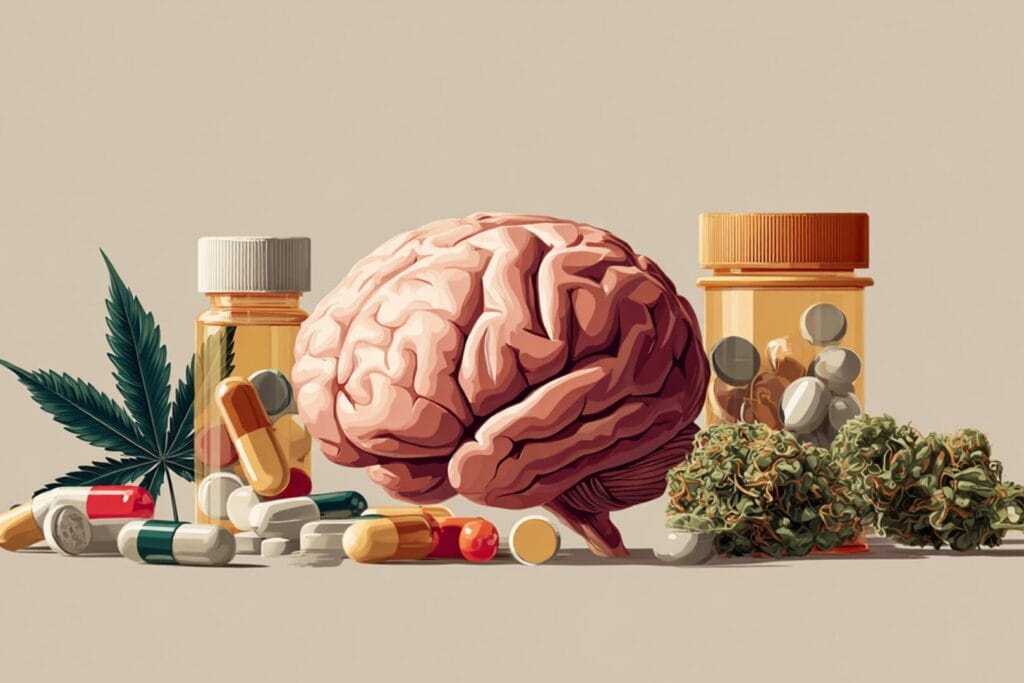An Overview of Alcoholism
Many different alcohol side effects can affect someone’s health and well-being. Side effects of drinking alcohol are increased with long-term alcohol abuse. Due to the many adverse side effects of long-term alcohol abuse, those struggling with a drinking problem must get proper help and support needed to recover.
To understand alcoholism and know if someone is struggling with a drinking problem, it’s important to know how standard, moderate, and excessive drinking looks.
What is a Standard Drink?
A standard drink is roughly 14 grams of pure alcohol. This amount of alcohol can usually be found in 12 ounces of beer, 5 ounces of wine, or 1.5 ounces of distilled spirits.
What Is Moderate Drinking?
According to the CDC, moderate drinking is defined as two drinks or less per day for men and one drink or less per day for women.
What is Excessive Drinking?
Excessive drinking includes heavy drinking, binge drinking, drinking by people who are under the age of 21 or drinking by pregnant women. The CDC defines binge drinking as four or more drinks per single occasion for women and five or more drinks per single occasion for men.
Side Effects of Alcohol on the Body
Alcohol use can have many adverse side effects on the body. Alcohol side effects are increased when someone drinks excessively or struggles with an alcohol use disorder.
Short-Term Side Effects of Drinking Alcohol
Common short-term side effects of alcohol include:
- Anemia (loss of red blood cells)
- Blackouts
- Coma
- Decreased perception and coordination
- Diarrhea
- Distorted vision and hearing
- Drowsiness
- Headaches
- Impaired judgment
- Slurred speech
- Trouble breathing
- Unconsciousness
- Upset stomach
- Vomiting
Heavy alcohol use in the short term can still have many adverse side effects that lead to poor decision-making and other potentially dangerous health issues.
Long-Term Side Effects of Alcohol
There are many long-term side effects of alcohol abuse that can affect the body and mind. Side effects of alcohol abuse can be physical or psychological. Proper treatment is required for alcohol addiction to avoid any potential long-term health complications with alcohol abuse.
Psychological Side Effects
Alcohol side effects on the brain include:
Brain Changes
Alcohol interferes with the brain’s communication pathways. Heavy drinking can change how the brain looks and works overtime, leading to poor mental health and cognitive functioning.
Alcohol-Induced Mental Health Conditions
Alcohol abuse can lead to mental health issues such as depression or anxiety. Excessive use of alcohol can also exacerbate existing mental health problems.
Alcohol Dependence
Excessive drinking over a long period can lead to dependence on alcohol. Alcohol dependence will make someone feel like they can’t function normally without drinking.
Alcohol Withdrawal
When someone has a physical alcohol dependence, they will experience withdrawal symptoms if they stop drinking. This is one of the main side effects of alcohol detox.
Physical Side Effects
Physical side effects of alcohol on the body include:
Liver Damage
When you drink alcohol, it is processed through the liver. Excessive drinking is hard for the liver to process all the toxins out of the body. Over the long term, this can damage the liver and may lead to long-term health issues.
Brain Damage
Alcohol side effects can impact the brain’s cognitive functioning in many ways. Long-term alcohol abuse can make it harder for someone to concentrate and focus or may lead to memory problems.
Cardiovascular Damage
Heavy alcohol use can also be hard on the heart and the body’s cardiovascular system. Severe heart conditions may result as a side effect of alcohol abuse.
Endocrine System Damage
Alcohol abuse can be hard on the body’s endocrine system. This can lead to hormonal damage, increased stress, and changes in mood or behavior.
Sexual or Reproductive Health
Alcohol abuse can result in erectile dysfunction in men and may disrupt menstrual cycles in women.
Immune System Risks
Alcohol side effects can result in a lowered immune system over time.
Musculoskeletal Health Risks
Long-term alcohol abuse can damage the musculoskeletal system leading to a higher likelihood of fractures, osteoporosis, and chronic joint pain.
Sugar Levels
Excessive drinking can put too much sugar in the body depending on the type of alcohol that is consumed. Drinking too many sugary beverages can lead to diabetes and other health issues.
Understanding Alcohol Abuse
To understand alcohol abuse side effects and how it can affect someone’s life, it’s vital to understand alcohol abuse and why it may occur.
What is Alcohol Abuse?
Alcohol abuse is characterized by frequent and excessive drinking over a long period of time. Someone who struggles with an alcohol abuse disorder will continue drinking despite experiencing adverse alcohol side effects in their life.
What Causes Alcohol Abuse?
Many factors can cause alcohol abuse. Common causes of alcohol abuse include:
- Career problems
- Growing up in an environment with heavy alcohol use
- Health issues
- Mental health issues
- Past trauma
- Peer pressure
- Relationship problems
- Stress
During treatment, it’s important to pay attention to potential causes of alcohol abuse to treat any underlying conditions contributing to the addiction.
Alcohol Abuse Risk Factors
Many risk factors can make someone more likely to abuse alcohol. Common alcohol abuse risk factors include:
- Amount of Alcohol: One of the most significant risk factors of alcohol abuse is the amount of alcohol consumed. Frequently drinking large amounts of alcohol significantly increases the risk of addiction.
- Sex: Alcoholism is more prevalent in men. However, women are at a greater risk for alcoholism associated with bodily damage or past trauma.
- Weight: Someone’s weight may impact their body’s ability to tolerate alcohol consumption. Those who are lighter will experience heavier effects from alcohol use. However, heavier people may experience fewer effects but may also be more prone to drinking higher amounts of alcohol.
- Age: Younger individuals tend to be more prone to developing an alcohol use disorder. Many young people abuse alcohol due to peer pressure and other social situations, which can lead to alcohol dependence over time.
- Underlying Health Conditions: Someone may choose to drink excessively as self-medication for underlying physical or mental health conditions.
- Alcohol Tolerance: You can build a tolerance to alcohol, making someone have to drink increasingly higher amounts of alcohol to get the same effects. Consuming high amounts of alcohol increases the chance of developing an addiction.
Treatment for Alcohol Abuse
If you or someone you care about is struggling with alcohol abuse, treatment options are available. Proper alcohol abuse treatment can help to avoid adverse alcohol side effects. Many treatment options are available for alcohol abuse to help facilitate recovery and maintain long-term sobriety.
Alcohol Detox
One of the first steps in an addiction treatment plan is detox. During alcohol detox, withdrawal symptoms will be experienced. However, proper treatment and support can help lessen the side effects of alcohol withdrawal.
Inpatient Rehab
Inpatient rehab is often a good option for alcohol addiction treatment. Inpatient rehab involves staying at a treatment center for a duration of time while working through a recovery program. During inpatient rehab, you will detox, attend therapy sessions, and work on other life skills that will help with maintaining long-term sobriety.
Outpatient Rehab
Outpatient rehab for alcohol addiction can also be a good option for those with a less severe addiction or who don’t want to neglect work or family responsibilities while receiving treatment. Outpatient rehab involves attending regular treatment sessions throughout the week at a treatment center.
Get Treatment for Alcohol Abuse at San Diego Detox
If you or someone you love is struggling with alcohol abuse or other substance use disorders, San Diego Detox can help. San Diego Detox is a treatment center that provides personalized and evidence-based addiction treatment. Our friendly and knowledgeable staff can help you every step of the way as you work through a treatment program and get on the road to recovery. Contact us today for more information about how we can help you.
Resources
- https://www.niaaa.nih.gov/alcohols-effects-health/overview-alcohol-consumption/what-standard-drink
- https://www.drugfreeworld.org/drugfacts/alcohol/short-term-long-term-effects.html
- https://www.ncbi.nlm.nih.gov/pmc/articles/PMC2913110/
- https://www.webmd.com/mental-health/addiction/understanding-alcohol-abuse-symptoms
Frequently Asked Questions
What are the signs of alcohol poisoning?
Alcohol poisoning occurs when the body is overwhelmed by too much alcohol, impairing vital functions. Common warning signs include:
- Confusion, stupor, or inability to wake
- Vomiting
- Seizures
- Slow or irregular breathing (fewer than eight breaths per minute, or gaps of more than 10 seconds between breaths)
- Hypothermia (low body temperature), bluish skin color
- Weak pulse, fainting
- Loss of gag reflex (risk of choking)
If you suspect someone has alcohol poisoning, call emergency services immediately.
Is alcohol damaging to health?
Yes. Alcohol can harm nearly every organ system in the body. Short-term effects include impaired judgment, accidents, and poisoning. Long term, excessive or chronic drinking is linked to liver disease (fatty liver, hepatitis, cirrhosis), cardiovascular problems, digestive issues, cancers (e.g. liver, esophagus, breast), weakened immune system, neurological damage, and mental health disorders.
What does giving up alcohol actually do to your body?
When you stop drinking, the body begins healing — though recovery timelines differ for each organ system:
- Within days to weeks: improved hydration, better sleep, stabilization of blood pressure, liver beginning to regenerate, improved gut health
- Over months: reduction in liver fat/inflammation, improved immune function, better cardiovascular health
- Over years: lower risk of cancer, improved brain function, reversal (partial) of alcohol-induced brain shrinkage in some cases, better overall longevity
That said, detox and withdrawal can be dangerous for heavy drinkers — medical supervision is often needed.
What does alcohol do to your brain?
Alcohol is a central nervous system depressant. Its effects on the brain include:
- Acute: slowed reaction time, impaired coordination, memory lapses, poor judgment, blackouts
- Neurotransmitter disruption: it enhances GABA (inhibitory) and suppresses glutamate (excitatory), which leads to sedation and cognitive slowing
- Long term: brain shrinkage (loss of gray and white matter), impaired learning/memory, mood disorders, and increased risk of dementia or alcohol-related brain injury.
Can alcohol change your personality?
Yes, chronic alcohol use can lead to changes in behavior, mood, and personality. Over time, you may see:
- Higher irritability, aggression, or mood swings
- Emotional flattening or apathy
- Increased impulsivity, poor decision making
- Depression, anxiety, or social withdrawal
These changes stem from alterations in brain circuits that regulate mood, reward, inhibition, and impulse control.







